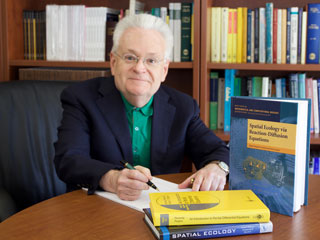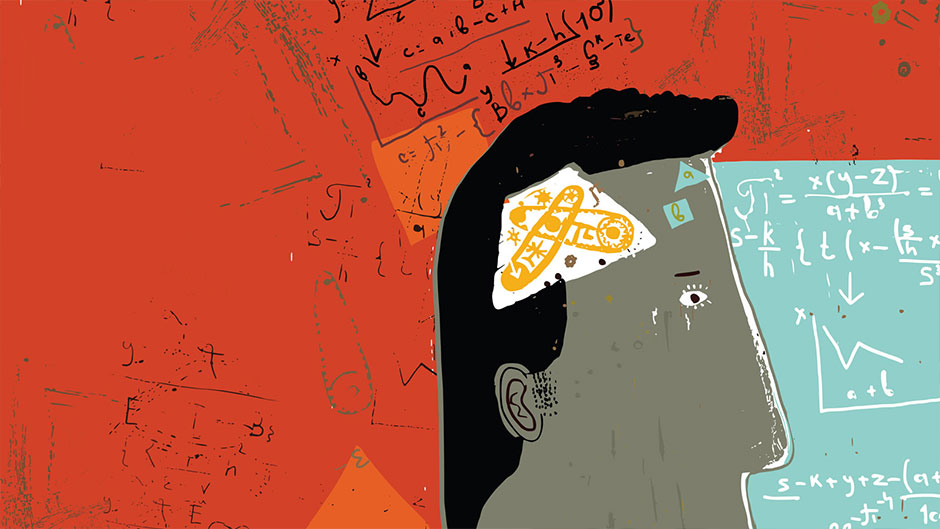Dedicated to fostering new collaborations in mathematics across the hemisphere, the University of Miami has launched the Institute of the Mathematical Sciences of the Americas (IMSA), with funding from one of the foremost private supporters of mathematics and basic sciences.
“Mathematics is a very international activity and we want to advance collaborations in both pure mathematics and in its applications to other fields,” said IMSA director Robert Stephen Cantrell, professor and chair of the Department of Mathematics. “Miami is the de facto intellectual capital of Latin America, so it’s a natural hub. This gives us the opportunity to enhance the stature of the department and the University.”
The institute, which was established with a $2 million grant from the New York-based Simons Foundation, is kicking off its first year with an inaugural conference Friday, Sept. 6-8, that will showcase 14 of the world’s top mathematicians. Among them: Harvard professor Denis Auroux, University of California professor Alan Hastings, UM professor Maxime Kontsevich, who also teaches at the Institute des Hautes Etudes Scientifiques in Paris, and James Simons, a distinguished mathematician who established the Simons Foundation while leading a successful hedge fund, Renaissance Technologies.
The institute’s mission aligns closely with the Roadmap to Our New Century, the University’s strategic plan for tackling world challenges by building new bridges across geographic, cultural, and intellectual borders, particularly in the STEM — science, technology, engineering, and mathematics — fields of inquiry.
“Math is truly the international language,” said Jeffrey Duerk, executive vice president for academic affairs and provost. “It allows powerful concepts to be communicated concisely and precisely across boundaries. Having a powerhouse for intellectual capital like IMSA will help the University of Miami distinguish itself in this critical discipline.”
Over the next five years, IMSA will engage in several working group projects where professors and graduate students from UM’s math department will be paired with academics from universities across Latin America to lead teams of researchers on significant projects in mathematics and its applications.
IMSA will also host semester-long programs. Cantrell said the initial program will be devoted to

mathematical sandpiles and homological mirror symmetry, a theory pioneered by Kontsevich about the geometry of infinitesimal structures that could ultimately lead to a better understanding of how particles interact in the universe.
But the center’s most important function will be to nurture ties between the University and Latin America with a series of collaborative partnerships.
“Mathematics in Latin America has developed extremely well the last 20 years, especially at IMPA [Brazil’s National Institute for Pure and Applied Mathematics],” said distinguished professor Phillip Griffiths, who was instrumental in landing the Simons grant.
“The time is right to establish stronger connections between U.S. math communities and others in the hemisphere,” Griffiths added. “The University has the track record to do this. It is really building on something that’s already in place and has been flourishing for years. It’s just something that makes a lot of sense at this point in time.”
Yuri Tschinkel, director of mathematics and physical sciences for the Simons Foundation, agreed.
“The University of Miami has had a very strong department with very distinguished faculty for many years,” Tschinkel said. “This is potentially a very important center for mathematics, especially as it connects to other communities across the Americas. The goal of this program is to build and strengthen communities. We hope our initial grant to UM will help enable that.”
With its grant, the Simons Foundation also recognized the numerous conferences and activities the University has hosted over the past decade, many of them leading to collaborations with institutions in Brazil and Mexico.
“What they expect us to do is very ambitious,” said IMSA co-director and math professor Ludmil Katzarkov. “They want to put this part of the U.S. on the scientific map. This has been a dream of Jim Simons for some time, and some huge steps in this direction have already been taken.”
David Menconi contributed to this report.

